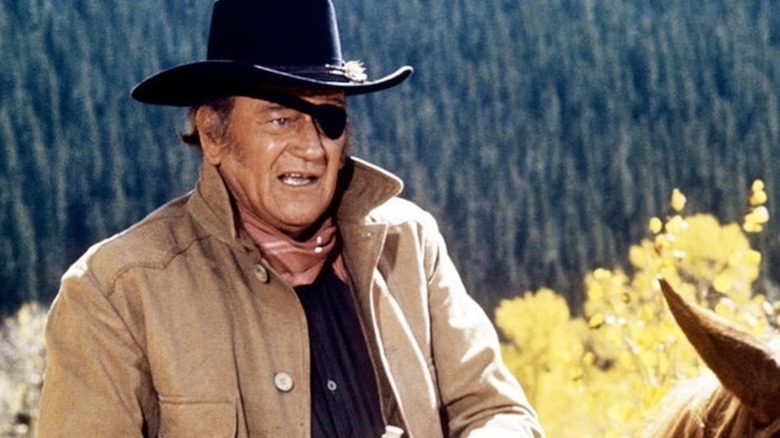Why John Wayne Wrote Clint Eastwood An Angry Letter Over High Plains Drifter
Between 1939 and 1964, John Wayne was the face of the Hollywood Western. There were major stars who thrived within the genre at the same time (James Stewart, Gary Cooper, and Henry Fonda), but they were too artistically ambitious to keep making the same kinds of movies over and over again. Wayne didn't mind playing outright bastards (see "Red River" or "The Searchers"), but he never would've played a disturbingly obsessed protagonist like Scottie Ferguson in "Vertigo," nor would he have allowed himself to be putty in the hands of Barbara Stanwyck in "The Lady Eve" or "Ball of Fire" (though she did make quick work of a pre-stardom Duke in "Baby Face"). When Wayne wanted to stretch, he made a war movie. And on the off-chance he did step outside of his comfort zone, he paid for it (possibly in more ways than one with "The Conqueror").
Basically, for two decades and change, when people thought of Westerns, they thought of Wayne. So it's understandable that he got to feeling a tad proprietary about the genre as he got older and moviegoers' appetites changed. Politically, Wayne was fiercely conservative and just as committed a patriot – at least when it came to rhetoric. He famously avoided any kind of military service during World War II (unlike contemporaries Stewart and Fonda), which rendered much of his chestiness hollow. But as far as Hollywood was concerned, he was very much the alpha dog, and when he objected to the dark direction the Western was headed in due to the popularity of Spaghetti Westerns in the 1960s, his opinion mattered more than anyone else's.
How upset was Wayne about the advent of revisionist, anti-heroic Westerns? Angry enough to harangue Clint Eastwood in a letter about it.
John Wayne thought Clint Eastwood misrepresented the settling of the American West
In a 1992 interview with Los Angeles Times film critic Kenneth Turan, Eastwood revealed that John Wayne wrote him a letter expressing his disgust for the director-star's revisionist Western "High Plains Drifter." The film, in which Eastwood plays an unnamed stranger who's hired to protect a small Old West town from outlaws, starts dark and gets darker as it heads to its satisfyingly bleak conclusion. His character is an antihero, which shouldn't have been a problem for Wayne. After all, he played a virulent racist in "The Searchers" and an unrepentant killer in "Red River."
According to Eastwood, Wayne's issue wasn't the character. It was the portrayal of the American West. According to Eastwood, Wayne wrote, "That isn't what the West was all about. That isn't the American people who settled who settled this country."
How did Eastwood feel about this? Here's what he said to Turan:
"I realized that there's two different generations, and he wouldn't understand what I was doing. 'High Plains Drifter' was meant to be a fable: it wasn't meant to show the hours of pioneering drudgery. It wasn't supposed to be anything about settling the West."
The Mountain Meadows Massacre in 1857 wasn't explicitly about settling the West, but it happened. There was all manner of cruelty and violence visited upon people while civilization reached out to the Pacific Ocean, and people like Wayne wanted to be in charge of writing the history cinematically because they knew the power of the medium outstripped the influence of a textbook. Perhaps if he'd served in World War II, he'd have developed a finer appreciation for the white man's capacity for evil. I'm grateful Wayne hooked up with Ford and Hawks to make some of the greatest Westerns ever made, but I'm even more grateful that folks like Eastwood, Sergio Leone, and Sam Peckinpah came along and told less than noble tales of the vicious bastards who helped settle the West via cold-blooded murder.

